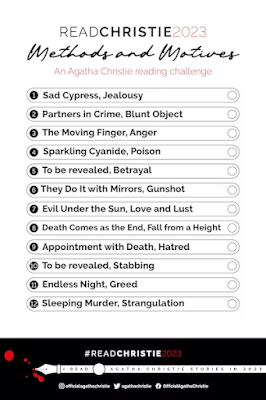Author: Agatha Christie
Publication: Berkley, paperback, originally published in 1940
Genre: Mystery/Series
Setting: Great BritainDescription: Elinor Carlisle and Roderick Welman met as children, visiting her Aunt Laura, who was married to his uncle Henry. They are engaged and expect either or both will inherit Laura Welman’s fortune. But when Elinor receives an anonymous letter warning her that someone is getting too close to Laura, she and Roddy decide to visit. They find that Mary Gerrard, who lives at the estate’s nearby with her father, has been regularly visiting Laura, who paid for her education and recently had a stroke. It seems innocuous but soon Laura is dead and Elinor is on trial for murdering Mary. Everyone is convinced of her guilt except Hercule Poirot . . .
My Impression: The story begins with Elinor on trial for murder, then flashes back to what led up to it. The reader learns that Elinor has loved Roddy since childhood but realized as an adult that she would have to be a Rules girl in order to secure his affection. Even the aunt who loves them both warns Elinor it is wise not to care too much:
“But I’ve always fancied that you had, perhaps, rather an intense nature – that kind of temperament runs in our family. It isn’t a very happy one for its possessors . . . . But, as I say, when you came back from abroad so indifferent to Roddy, I was sorry about that, because I had always hoped you two would come together. And now you have, and so everything is all right! And you do really care for him?”Was Aunt Laura worried that jealousy could destroy Elinor's life or that caring too intensely would cause her to lose Roddy?
Elinor said gravely:
“I care for Roddy enough and not too much.”
Unfortunately, Roddy is weak and falls for someone else – the previously overlooked Mary Gerrard. Elinor sees it happen and is very jealous: she has a motive and opportunity to kill Mary and we know Agatha doesn’t hesitate to create protagonists who are murderers, if she feels like it.
In the second section, Hercule Poirot is recruited to investigate Mary’s death (and some critics think the reader shouldn’t have to wait for nearly 100 pages for Poirot to appear). I was preoccupied by trying to recall something from another of Christie's books – doesn’t Poirot say that in relationships there is always one who loves and one who is loved? That is the situation here: Elinor definitely loved Roddy but he was intrigued by her coolness rather than passionately in love. Although Roddy is sufficiently loyal to attend the trial, noticeably it is not he who hires Hercule Poirot! Elinor is so traumatized by Mary’s death, at being arrested, and shame at her feelings about Mary, she does not seem able to defend herself at all.
The shortest and final section of the book covers Elinor’s trial, and her anguish as she listens to the evidence against her. One odd thing about the trial is that Elinor is not the final witness to testify. That is often part of the drama in fictional (and real) trials – the defendant has to listen to all the witnesses as the case against her is presented. Then she and her lawyer make the decision about whether she will testify. Are UK trials really different in that regard? I don't know any English barristers, unfortunately. However, this is an emotional story, not a legal thriller, and things get more confusing before Poirot pulls the rabbit out of the hat. The title is from a song in Shakespeare’s Twelfth Night.
In the second section, Hercule Poirot is recruited to investigate Mary’s death (and some critics think the reader shouldn’t have to wait for nearly 100 pages for Poirot to appear). I was preoccupied by trying to recall something from another of Christie's books – doesn’t Poirot say that in relationships there is always one who loves and one who is loved? That is the situation here: Elinor definitely loved Roddy but he was intrigued by her coolness rather than passionately in love. Although Roddy is sufficiently loyal to attend the trial, noticeably it is not he who hires Hercule Poirot! Elinor is so traumatized by Mary’s death, at being arrested, and shame at her feelings about Mary, she does not seem able to defend herself at all.
The shortest and final section of the book covers Elinor’s trial, and her anguish as she listens to the evidence against her. One odd thing about the trial is that Elinor is not the final witness to testify. That is often part of the drama in fictional (and real) trials – the defendant has to listen to all the witnesses as the case against her is presented. Then she and her lawyer make the decision about whether she will testify. Are UK trials really different in that regard? I don't know any English barristers, unfortunately. However, this is an emotional story, not a legal thriller, and things get more confusing before Poirot pulls the rabbit out of the hat. The title is from a song in Shakespeare’s Twelfth Night.
Source: Library. This was my third book of the year for Carol’s Cloak and Dagger Reading Challenge. I also read it for #ReadChristie2023.




Nice review, Constance. I remember liking this book but it was not a favorite. I always like books with Poirot. It isn't that unusual for him to show up late in a story. Miss Marple sometimes does that too.
ReplyDeleteI was interested in the Read Christie challenge in 2022 but they mostly choose books I have read already and am not ready to reread. Same for this year's books.
Seems like one of the lesser known Poirot books. Lovely review!
ReplyDelete